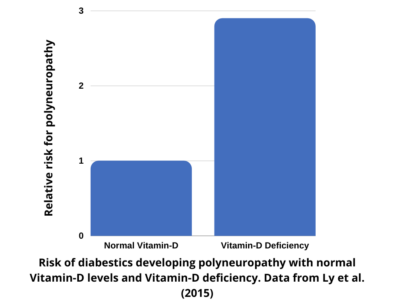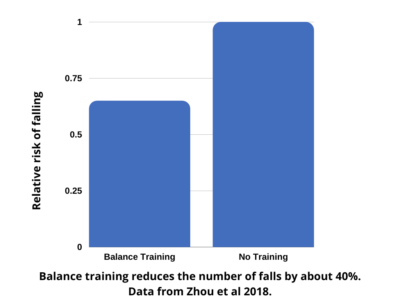Does vitamin D help against polyneuropathy?
Vitamin D is high on the agenda right now, especially because it's been in the media a lot lately and has many effects on health.
But what about vitamin D and polyneuropathy? Does it actually help? How big are the effects? What are the risks? How much vitamin D can you take?
Because, as with all vitamins, a lot of promises and reports about huge effects are out there. However, it is difficult to find reliable information.
That is why I have summarized results of studies here and translated them into practical recommendations.

The most common vitamin deficiency
It is already known that a deficiency of vitamin D is associated with numerous health problems.
For example, according to some studies, a deficiency of vitamin D increases the risk of heart disease, bone fractures, autoimmune diseases and even some types of cancer.
It is also known that a deficiency of the "sun vitamin" is very common in northern countries. This is because the vitamin is only found in small quantities in our food. However, the body is able to produce it itself when sunlight hits the skin. The body should cover 80-90% of the requirement with vitamin D, which it produces itself when the sun's rays fall on the skin(RKI).
However, we spend time out in the sun far too rarely to produce enough vitamin D. That's why our bodies can't make enough of it either.
According to the Robert Koch Institute, 56% of the German population therefore have vitamin D levels that are below the optimum(RKI). In many places, therefore, vitamin D is now mentioned as the only vitamin that should be taken in addition to the normal diet.
But what does this mean for polyneuropathy?
56% of the people in Germany
have too little vitamin D
Vitamin D deficiency and polyneuropathy are related
Of course, a lack of vitamins is always associated with negative consequences.
Whether vitamin D deficiency plays a role in polyneuropathy has been studied mainly in diabetics. Unfortunately, little research is available for other forms of polyneuropathy.
Numerous studies on the subject indicate that people who have diabetes and too little vitamin D in their blood are more likely to develop polyneuropathy.
In a meta-analysis (i.e., a study that analyzes and summarizes the results of other studies) in the" Journal of endocrinological investigation", it was reported that diabetics who suffered from vitamin D deficiency were almost three times more likely to also develop polyneuropathy. You can read the study here.

So if you have diabetes, you should pay special attention to having enough vitamin D in your blood.
The shortage seems to have even more negative effects here than usual.
Whether the lack of vitamin D also leads to an increased risk of polyneuropathy in people who do not suffer from diabetes has not yet been scientifically clarified. My personal assumption, however, is that there is also a connection here.
Vitamin D protects against bone fractures
However, vitamin deficiency does not only lead to polyneuropathy, it also has other effects on the body.
Those who suffer from polyneuropathy have a significantly increased risk of tripping, falling and injuring themselves. Of course, if you also have fragile bones, you'll break something more easily.
And here, too, vitamin D can help. Because it helps maintain the strength of bones by helping to incorporate calcium.
Those who have enough vitamin D therefore protect themselves from osteoporosis and frequent bone fractures. This is especially true if calcium and vitamin K2 are taken in sufficient amounts at the same time.
Vitamin D is also important for the muscles
Those who have too little vitamin D also have poorer muscle function.
This is reflected in less muscle strength, but also in a greater risk of falling.
In some studies, people who had low levels of the vitamin in their blood were given a dietary supplement to compensate for the deficiency.
Subjects taking the drug fell about 20 percent less often than those receiving placebos alone. This means that one out of 5 falls could be prevented.
Since polyneuropathy patients unfortunately fall very frequently and often injure themselves, this is another reason to ensure adequate care.
By the way, you can additionally protect yourself from falls with balance exercises. At the following link you will find exercises to do at home:

Muscle regeneration improves due to vitamin D
In addition, vitamin D helps the muscles to regenerate after exercise. Those who have a lot of vitamin D in their blood, therefore, their muscles adapt more quickly to their tasks and become stronger faster. (If you are scientifically very interested, here is a very good lecture from the European College of Sports Science on the topic: ECSS Mechanisms of Vitmamin D).
This plays a role in polyneuropathy that should not be underestimated, because polyneuropathy often results in different movement patterns and postures than before. So the muscles have to adjust and often there is greater strain on individual muscles than before because you move differently without realizing it. Often, for example, people adopt bad postures because they can no longer control their toes and feet as well as they could before they had polyneuropathy. This puts more strain on other parts of the musculoskeletal system. The better your muscles work, the better they can cope with such changes without getting more problems
If the muscles can therefore regenerate well due to a sufficient supply of vitamin D, one therefore prevents many consequential damages of the polyneuropathy on the musculoskeletal system and in particular also pain, which is caused by incorrect posture and overloaded muscles and which is added to the pain that the polyneuropathy already makes anyway.
However, this effect should not be overestimated. You can't expect to take some vitamin D and suddenly become super strong and fit. These are rather effects that are felt in the medium term. In addition, of course, the effect of targeted training is much greater than that of supplementation with vitamins.
Does vitamin D cure polyneuropathy?
But does vitamin D help heal nerve damage in polyneuropathy? There are indeed some indications of this.
In two studies, patients who suffered from polyneuropathy due to diabetes and had too little vitamin D in their blood were given the nutrient to correct the vitamin deficiency.(You can find one of the studies here).
In fact, this showed an improvement in symptoms. Patients reported less discomfort and less pain after the vitamin deficiency was corrected.
So it does seem that polyneuropathy can improve if you compensate for the vitamin D deficiency. However, it is unlikely that vitamin D supplementation will result in a complete cure.
In particular, if the cause of the polyneuropathy persists, for example, one continues to suffer from diabetes, even vitamin D cannot heal the nerves. In such cases, one can only hope to slow down the worsening of the disease through the vitamin D.
Unfortunately, it is not possible to say how much vitamin D helps against polyneuropathy in individual cases based on the study results. Each individual situation is so different that it is not possible to make a precise prognosis.
Nevertheless, it is safe to say that in polyneuropathy it is even more useful than usual to get your blood levels of vitamin D to a healthy level.
Does it help against polyneuropathy to take big amounts of vitamin D?
Until now, I have only talked about compensating for a deficiency. What if you already have enough vitamin D? Should you also take supplements then? Or should you even take very large amounts of vitamin D to cure polyneuropathy?
For vitamins, as for all nutrients, taking more than the optimum is useless and can even be harmful.
Vitamin D is not something that you have to take as much of as possible to get as much benefit as possible.
Your body needs a certain amount of it. Once this amount is in your blood, it is of no use to consume more.
As a matter of fact there even is a risk of damaging your kidneys, for example, by taking excessive amounts. There have already been cases of life-threatening kidney failure due to vitamin D overdoses.
Under medical supervision, it is possible to perform what is called high-dose therapy. Very large amounts of vitamin D are given and it is hoped that this will cure the polyneuropathy.
To my knowledge, however, all such attempts have so far been disappointing. If you still want to try this, be sure to do so under expert guidance.
Anyone taking large amounts of vitamin D must first be examined by a physician to determine whether such experiments are safe. It is also necessary to follow a certain diet, which can, for example, reduce the risk of kidney damage.
Danger of overdose
Many people think it is good to always take as many vitamins as possible and therefore consume large amounts of them. Vitamin C in particular is very popular and is added artificially to many drinks. This is not a problem for the body, because water-soluble vitamins are not stored in the body, but leave it again via the urine after a relatively short time. Therefore, it is hardly possible to harm yourself with too much vitamin C.
For vitamin D however, this is different. This vitamin is fat-soluble and is absorbed by the body and can be stored for a long period of time. If you take too much vitamin D, it is not simply excreted again but remains in the body.
There, it causes a disturbance in calcium metabolism, which causes major problems for the kidneys in particular. Life-threatening kidney failure is a possible consequence. Therefore, be sure to follow the manufacturer's instructions and do not act according to the phrase "a lot helps a lot"!
Vitamin D helps with polyneuropathy - when there is a deficiency
So it is quite possible to get some relief with vitamin D in polyneuropathy and especially to slow down further aggravation.
However, only if you suffer from a deficiency. If you already have enough vitamin D, it won't do you any good to take more. So, unfortunately, the vitamin is not a miracle cure that can heal you in a short time.
Nevertheless, it makes sense for every polyneuropathy patient to compensate for any deficiency. It's best to simply have your blood levels of vitamin D measured.

Do we need vitamin D supplements for polyneuropathy?
With almost all vitamins, it is true that you can get enough of them through a healthy diet. Unfortunately, this is not the case with vitamin D.
It is found only in very small amounts in our food. This is also the reason why our body can produce the vitamin itself. However, average people in northern countries spend far too little time in the sun for that.
It is therefore very difficult in our latitudes to compensate for a vitamin D deficiency without taking supplements.
If you suffer from a deficiency, it is therefore almost inevitable to take vitamin supplements. While doing so, liquid vitamin preparations are better than pills.
This is because vitamin D is fat-soluble and already comes in dissolved form in the liquids. This makes it easier for your body to absord it.
If you have not yet taken a vitamin D test, you can safely take vitamin D "on spec" as long as you do not take more than recommended by the manufacturer. Currently, up to 4000 IU daily is considered safe. However, it is not recommended to take this entire dosage.
It is usually sufficient to stick to the manufacturer's recommendation which is usually 1000 IU per day. If you want to take more you should discuss it with a doctor.
Conclusion
For every day life, you can follow the following rules:
Consume about 1000 IU of vitamin D daily, as recommended by most manufacturers, unless otherwise instructed by a doctor or therapist.
Take liquid vitamin D instead of pills, as the vitamin can then be absorbed more easily.
As a polyneuropathy patient, have your vitamin D levels measured, especially if you have Diabetic Polyneuropathy.
For more info on nutrition in polyneuropathy, click here: Nutrition in polyneuropathy
If you have pain due to polyneuropathy, you can find tips for self-help here: Pain in polyneuropathy and what you can do about it

